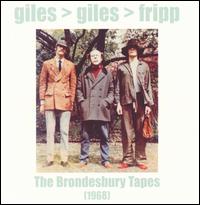
- Format: MP3

Considering that Giles, Giles & Fripp's original album sold about 500 copies, the very existence of this 70-minute CD is a source of astonishment as well as delight. Comprised of privately made tapes of the legendary progressive/pop/rock trio — all home recordings, on a Revox stereo reel-to-reel recorder, that made lots of use of overdubbing — this CD shows Robert Fripp, Peter Giles, and Michael Giles (along with Julie Dyble and Ian McDonald) at their most experimental. Virtually all of what ended up on The Cheerful Insanity of Giles, Giles & Fripp seems to have started life here, before they ever got into Decca's studios, so this is a chance to hear some of their released music as works-in-progress, most notably Robert Fripp's "Suite No. 1" (which was later transmuted into "Prelude: Song of the Gulls" from Islands), and an early Fripp guitar piece, "Tremelo Study in A Major." King Crimson completists will also be overjoyed to find the GG&F rendition of "I Talk to the Wind" (two different takes of it, in fact) in its original version, sung by Julie Dyble, which appeared on the double LP Young Person's Guide to King Crimson, finally turning up on CD on this disc. Also present on this CD is another lost early link in Crimson's subsequent output, "Why Don't You Just Drop In," which evolved through several intermediate stages into "The Letters" on Islands; and a portion of Fripp's "Passages of Time" ended up in the bridge of "Peace—A Theme" from In the Wake of Poseidon. Dyble turns up on vocals along with Ian McDonald (who plays sax, flute, and keyboards, as well as singing) on "Make It Today," a smooth piece of progressive pop-jazz (complete with a McDonald sax solo) that sounds as though it could have come from Judith Durham of the Seekers in a light moment. McDonald is all over these tapes, playing flute on an outtake of "Digging My Lawn" and saxes and piano elsewhere. Not all of it is great music — "Plastic Pennies" is pure (albeit pleasant) pop, worthy of the Seekers — but the raw talent is impressive. Additionally, listening to these tapes, one gets the sense that Giles, Giles, Fripp & McDonald, whatever they called themselves, could have made it, at least as far as the jazz clubs in England, without ever becoming what we later knew as King Crimson. There's also a pleasant bonus for fans of Peter Sinfield, whose "Under the Sky" (later a centerpiece of his solo album), turns up here in its ethereal original version, sung by Dyble. There is distortion on a few tracks, but most of what's here displays amazingly good quality for home demos dating back more than 30 years.